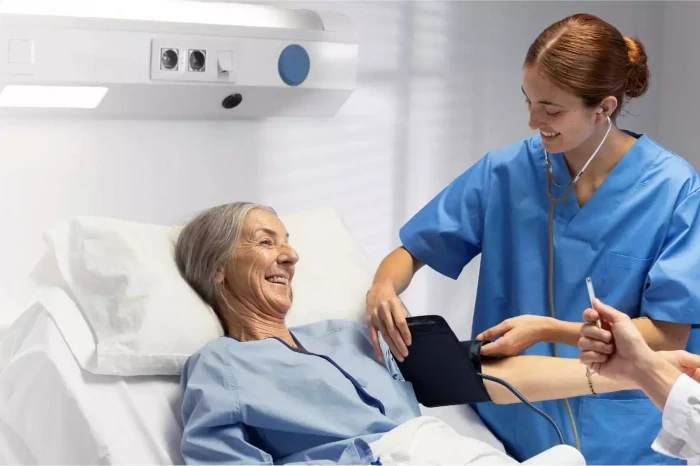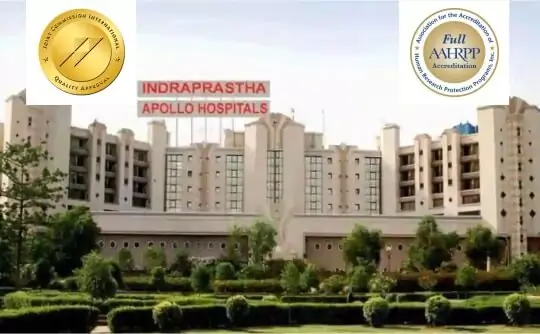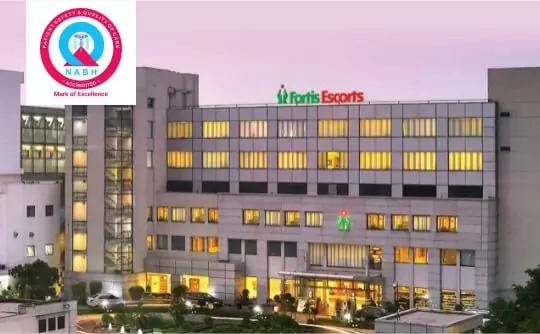

A significant component of a child's Truncus Arteriosus Treatment Cost in India is the pediatric heart surgeon's fees. IndiCure recommends highly experienced, skilled, board-certified heart surgeons who have track record of delivering excellent results. While the charges may vary based on the surgeon's experience, you can be confident that you are in safe and capable hands when opting for affordable heart surgery in India with IndiCure Health Tours.
In the pursuit of enhancing patient care, the medical field continually introduces new techniques and technologies into surgical procedures. These innovative advancements are designed to improve outcomes, reduce recovery times, and increase the overall effectiveness of treatments. While these advancements can significantly benefit patient care, they may also lead to higher Truncus Arteriosus Treatment cost in India.
Selecting an accredited medical facility with skilled and qualified medical staff is essential for the success of a child's Truncus Arteriosus Treatment in India. Larger cities in India generally provide superior medical facilities and more experienced surgeons, leading to higher costs. IndiCure Health Tours recommends surgical facilities in these larger cities to prioritize quality of care and ensure patient safety of our foreign guests.
The Truncus Arteriosus surgery-related expenses include the pre- and post-surgical expenses. The pre-surgical expenses are associated with the age and medical condition of the patient and thus the number and type of investigations required. The Post-surgical expenses for Truncus Arteriosus may include prescription medications and follow-up consultations.
At IndiCure Health Tours, we consolidate most of the expenses for your Truncus Arteriosus Treatment in India to provide you with an inclusive and cost-effective package tailored to your budget and individual requirements. After receiving medical reports, your case manager will provide an estimated cost based on a discussion with the heart surgeon.
The final Truncus Arteriosus Treatment cost in India can however be confirmed after your face-to-face consultation with the heart surgeon in India.

We Help you Choose the Right Treatment, Surgeon & Hospital

We Arrange Video/Telephonic Consultation with the Surgeon

We Assist you with Visa & Accommodation

We Receive you at the Airport and Drop you at Hotel/Hospital

We Assist you the at Hospital & Provide Post Operative Support
IndiCure Health Tours offers exclusive savings on your medical travel to India. We partner top hospitals in India at negotiate special rates, ensuring you get the best healthcare at the best possible price when you plan your medical tour with us.

Here is a set of questions you should consider asking before commencing your journey for Truncus Arteriosus Treatment in India.
Prepare to answer questions about your:
Any patient with truncus arteriosus who are experiencing abnormal heart function, heart rhythm disturbances, high blood pressure in the lungs.
Truncus arteriosus repair is necessary for individuals experiencing abnormal heart function, irregular heart rhythms, or pulmonary hypertension (high blood pressure in the lungs). These conditions result from the heart's inability to effectively pump oxygen-rich blood, leading to complications. Most cases involve infants diagnosed shortly after birth, as untreated truncus arteriosus can lead to severe heart failure or life-threatening conditions.
The surgical repair of truncus arteriosus requires the use of heart-lung bypass machine support. It involves three major components:
Steps : Most infants will require a period of very close monitoring in the Cardiac Intensive Care Unit while their heart function recovers from the major reconstruction.
The surgical repair of truncus arteriosus is a complex procedure that requires the use of a heart-lung bypass machine to temporarily take over the function of the heart and lungs during surgery. The repair involves three critical components
Separation of the Common Arterial Trunk: The surgeon separates the single large vessel (truncus) into two distinct pathways – the aorta and the pulmonary artery.
Ventricular Septal Defect (VSD) Closure: Since most patients with truncus arteriosus have a hole between the lower chambers of the heart (VSD), the surgeon closes this defect to ensure proper blood flow through the heart.
Conduit or Graft Placement: A tube or conduit is placed between the right ventricle and the pulmonary artery to establish a connection for blood to flow into the lungs for oxygenation.
After surgery, most infants require close monitoring in the Cardiac Intensive Care Unit (CICU) to ensure their heart function recovers from the reconstruction.
It normally takes a few weeks to fully recover. The kid may require additional surgery in the future to replace the conduit or tube that connects the right ventricle and pulmonary artery that was placed. Your cardiologist may advise you to avoid participating in certain high-intensity competitive sports. Inquire with your cardiologist about which activities are safe.
Recovery from truncus arteriosus repair typically takes several weeks. During this period, the child may experience temporary weakness or fatigue as the heart adjusts to its new structure. Follow-up care is essential, and additional surgery may be necessary in the future to replace the conduit or tube connecting the right ventricle to the pulmonary artery, as these components may not grow with the child and could need replacement over time.
The cardiologist will provide guidance on which activities are safe, particularly regarding participation in high-intensity or competitive sports. Some restrictions might be recommended to prevent unnecessary strain on the heart.
Currently more than 90 percent of children survive repair of truncus arteriosus. Typically, there will be no physical restrictions imposed on the child.
The long-term outcomes of truncus arteriosus repair are generally very favorable, with over 90% of children surviving the procedure. In most cases, children lead healthy, active lives without significant physical limitations. With ongoing medical follow-ups, many can participate in normal activities, though some may need periodic evaluations and potential interventions in the future.

New Delhi
Indraprastha Apollo Hospitals, New Delhi is a state of the art multi speciality tertiary-care hospital situated in the most posh area of South Delhi. Considered to be the flagship hospital of Apollo group, Indraprastha Apollo Hospital is one of the important landmarks not only in Delhi, but in the world map because of its popularity among the medical tourists. The hospital has been one of the most sought after medical institutions for patients from Asia Pacific and beyond.

New Delhi
Fortis Escorts Heart Institute and Research Centre is one of the most revered medical institutions not only in India, but the entire world. The institute has set benchmarks in cardiac care with path-breaking work over the last 25 plus years. The hospital has the most advanced technology and has seen the best outcomes even in the most complex cardiac cases; be it cardiac surgery, Interventional Cardiology, Pediatric Cardiology, Pediatric Cardiac Surgery or Non-invasive Cardiology
The oxygen-poor blood that should go to the lungs and the oxygen-rich blood that should go to the rest of the body are intermingled as a result of truncus arteriosus. This causes serious circulation issues. Truncus arteriosus can be lethal if left untreated.
Truncus arteriosus requires surgery to be treated. Medications to reduce fluid in the lungs and high-calorie feedings to develop strength may be required while your baby waits for surgery. In the first few days or weeks of life, most newborns with truncus arteriosus require surgery.
Most babies will die if the truncus arteriosus is not corrected through surgery. The surgery to correct it is usually effective, and the majority of babies recover quickly. However, as babies grow, some will require more procedures.
It is unknown what causes truncus arteriosus. Some cases may arise as a result of a complex combination of genetic and environmental variables, according to some theories (multifactorial inheritance).
It's best to have surgery before your baby turns two months old for the best results and outcomes.
The surgeon will place a conduit during the truncus arteriosus procedure. The conduit used to establish the pulmonary artery will need to be altered as the child develops, necessitating a second surgery.
If risk factors are recognized, a fetal echocardiography performed between 18 and 24 weeks of pregnancy can provide detailed information on the heart. This test usually takes about 45 minutes. Depending on the outcome, suitable measures and arrangements should be implemented in order to ensure the best prognosis.
In addition to the surgery cost of Truncus Arteriosus Treatment in India, there are several other expenses you should plan for when organizing your medical travel to India. These include:
Pre planning for all the above expenses along with the cost of Truncus Arteriosus Treatment in India, will help you ensure a smooth and hassle-free experience of medical travel to India.
Enhance your medical journey to India by availing these extra services.
Traveling abroad for medical reasons may be challenging. With our experience of over a decade and working with the best surgeons and top hospitals in India, we help make your medical tour easier and safer for you. We will guide you at every step of the way and make end-to-end arrangements for your surgery, travel, and stay.
Ramandeep Dhaliwal
a month ago
I had great experience having rhinoplasty through Indicure. Dr. Ruchika from Indicure has helped me in finding best plastic surgeon, answering all my questions...
Read More
Joshua Archer
3 months ago
My name is Joshua Archer I'm from New Zealand, bay of plenty, kawerau I opted for the bypass surgery in January 2023 but planned it in advance for 28 September found IndiCure...
Read More
Kera Ren
8 months ago
Absolutely loved my experience with IndiCure - from first inquiring to meeting the surgeon pre op to my follow up post op. The surgeon was extremely approachable...
Read More
Andreana Paul
5 months ago
Had a wonderful experience. Visited India for my plastic surgery. From sending mails, airport pickup, comfortable accommodation and, to smooth hospital appointment booking...
Read More
Brandi Luce
5 months ago
I had the privilege of using Indicure's services for a cosmetic procedure that I had wanted for a long time but had always been apprehensive about. Ruchika helped me...
Read More
Jade M
3 years ago
Indicure Health Tours went above and beyond my expectations. They helped me with every aspect of my journey and were professional, kind and caring. I was...
Read More
The content on the website (www.indicure.com) is intended to be general information and is provided only as a service. All photographs on our website of before and after results are examples only, and do not constitute an implied or any other kind of certainty for the result of surgery.
Learn about IndiCure Health Tours' comprehensive editorial policy that strives to deliver trustworthy, helpful, relevant, accurate and people-first content on medical tourism in India.
It is not medical advice and should not be taken as medical advice. It should not be used to diagnose or treat a health condition and is in no way meant to be a substitute for professional medical care. You are advised to see a surgeon in person to assess what surgery may or may not accomplish for you.
It is also important to keep your expectations realistic and to understand that all surgical procedures carry risks and should never be taken lightly.